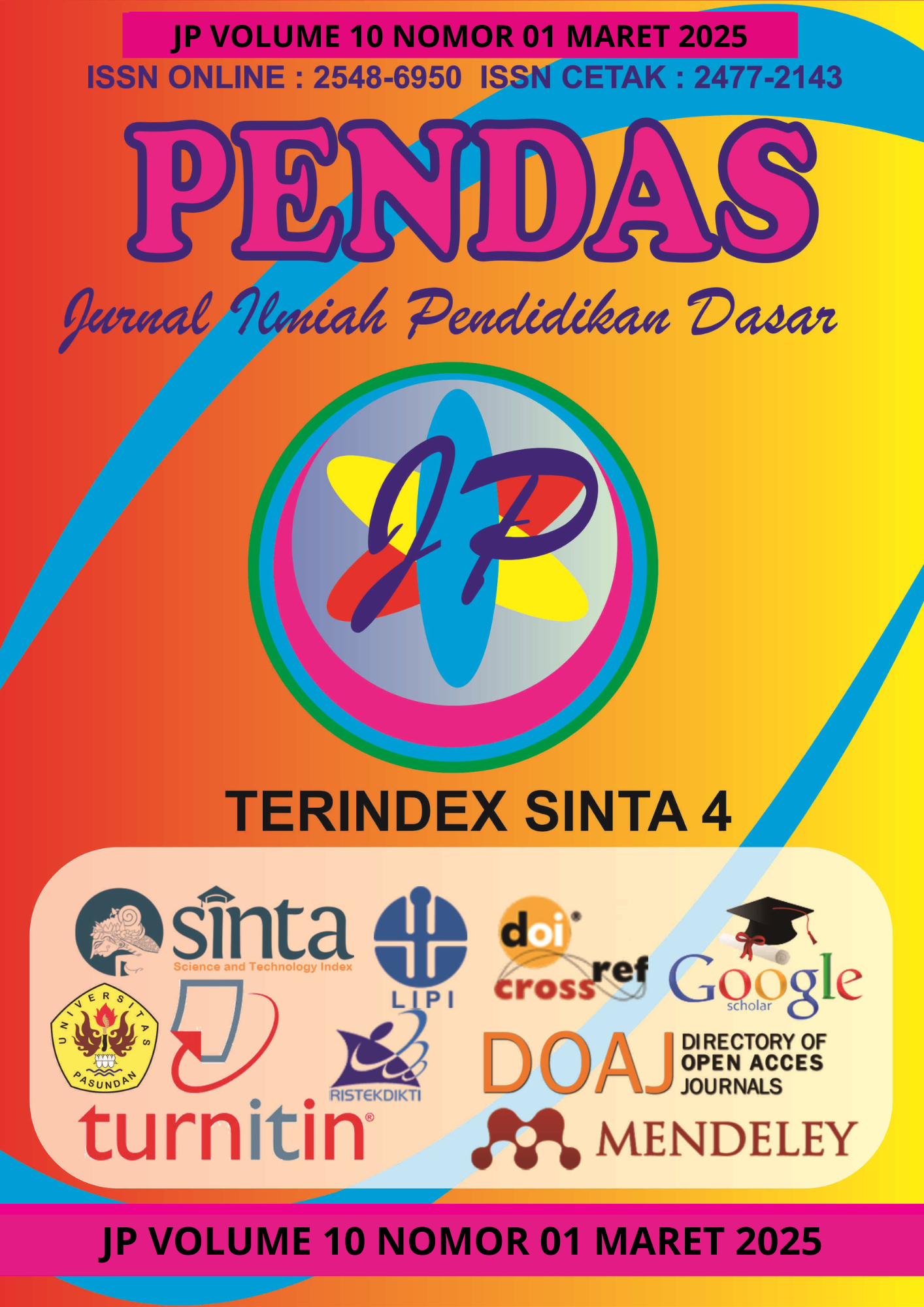KEBIJAKAN MERDEKA BELAJAR DI PENDIDIKAN DASAR: RESPONS GURU DAN IMPLIKASI BAGI PEMBELAJARAN
DOI:
https://doi.org/10.23969/jp.v10i01.23581Keywords:
primary education, merdeka belajar, implications, learningAbstract
Merdeka Belajar is a policy aimed at facilitating teachers in implementing online learning during the pandemic. This policy seeks to realize the essence of education, where students are granted the freedom to learn and to develop their competencies. The success of the Merdeka Belajar policy depends greatly on the roles of principals and teachers, as key actors in school-based education. When Merdeka Belajar is fully embraced by teachers, it will also be reflected in students. This study aims to explore teachers' responses to the Merdeka Belajar Kampus Merdeka policy. A descriptive quantitative method was used in this research, with a questionnaire distributed via Google Forms as the primary instrument. The respondents included 47 teachers from 11 primary-level schools. The data obtained were analyzed using single-tabulation and percentage techniques. The results of this study indicate that teachers understand the concept of Merdeka Belajar, agree with its implementation implications in schools, and believe that Merdeka Belajar-based teaching and assessment will enhance students' literacy and numeracy skills.
Downloads
References
Abidah, A., Hidaayatullaah, H. N., Simamora, R. M., Fehabutar, D., & Mutakinati, L. (2020). The Impact of Covid-19 to Indonesian Education and Its Relation to the Philosophy of “Merdeka Belajar.” Studies in Philosophy of Science and Education, 1(1), 38–49. https://doi.org/10.46627/sipose.v1i1.9
Arifin, I. (2019). Kepemimpinan Religio-Humanistik Bidang Pendidikan pada Era Revolusi Industri 4.0. dan Society 5.0.
Asmuni, A. (2020). Problematika Pembelajaran Daring di Masa Pandemi Covid-19 dan Solusi Pemecahannya. Jurnal Paedagogy, 7(4), 281. https://doi.org/10.33394/jp.v7i4.2941
Cahapay, M. B. (2020). The responsiveness of bachelor of elementary education curriculum: An illuminative evaluation. International Journal of Evaluation and Research in Education, 9(3), 743–750. https://doi.org/10.11591/ijere.v9i3.20649
Fauzi, I., & Sastra Khusuma, I. H. (2020). Teachers’ Elementary School in Online Learning of COVID-19 Pandemic Conditions. Jurnal Iqra’ : Kajian Ilmu Pendidikan, 5(1), 58–70. https://doi.org/10.25217/ji.v5i1.914
Fikri, H. T., & Mariana, R. (2022). Technology Readiness dan Computer Self Efficacy pada Guru dalam Sistem Pembelajaran Daring. Analitika, 14(1), 47–58. https://doi.org/10.31289/analitika.v14i1.6015
Irsalulloh, D. B., & Maunah, B. (2023). Peran Lembaga Pendidikan Dalam Sistem Pendidikan Indonesia. PENDIKDAS; Jurnal Pwndidikan Dalam Situs, 04(02), 17–26.
Kastaji, K., Patoni, A., & Maunah, B. (2024). Urgensi Leadership Dan Manajerialship Kepala Sekolah dalam Meningkatkan Kinerja Sekolah. Al-Mikraj: Jurnal Studi Islam Dan Humaniora, 4(02).
Kurniati, T., Yusup, I. R., Hermawati, A. S., & Kusumahwardani, D. (2021). Respon Guru Terhadap Kendala Proses Pembelajaran Biologi di Masa Pandemi COVID-19. Jurnal Educatio FKIP UNMA, 7(1), 40–46. https://doi.org/10.31949/educatio.v7i1.765
Lawrence, L., & Wu, J. (2021). China’s higher education governance during COVID: a mixed-methods study of policy analysis and student perspectives. Asian Education and Development Studies, 10(2), 295–307. https://doi.org/10.1108/AEDS-05-2020-0115
Surat Edaran Nomor 1 Tahun 2020 cap, Permendikbud 2 (2020).
Mulyani, H., Meirawan, D., & Rahmadani, A. (2020). Increasing school effectiveness through principals’ leadership and teachers’ teaching performance, is it possible? Cakrawala Pendidikan, 39(2), 279–292. https://doi.org/10.21831/cp.v39i2.28864
Nuryatno, M. A. (2015). Critical Remarks on Educational Philosophy of Paulo Freire. Jurnal Cakrawala Pendidikan, 1(1), 1–16. https://doi.org/10.21831/cp.v1i1.1542
Prasetyono, H., Abdillah, A., Djuhartono, T., Ramdayana, I. P., & Desnaranti, L. (2021). Improvement of teacher’s professional competency in strengthening learning methods to maximize curriculum implementation. International Journal of Evaluation and Research in Education, 10(2), 720–727. https://doi.org/10.11591/ijere.v10i2.21010
Sakti, A. (2023). Meningkatkan Pembelajaran Melalui Teknologi Digital. Jurnal Penelitian Rumpun Ilmu Teknik (JUPRIT), 2(2), 212–219. https://doi.org/10.55606/juprit.v2i2.2025
Santín, M. F., & Torruella, M. F. (2017). Reggio emilia: An essential tool to develop critical thinking in early childhood. Journal of New Approaches in Educational Research, 6(1), 50–56. https://doi.org/10.7821/naer.2017.1.207
Saputra, I. G. P. E., Sukariasih, L., & Muchlis, N. F. (2022). Penyusunan Modul Projek Penguatan Profil Pelajar Pancasila (P5) Menggunakan Flip Pdf Profesional Bagi Guru SMA Negeri 1 Tirawuta: Persiapan Implementasi Kurikulum Merdeka. Prosiding Seminar Nasional UNIMUS, 5, 1941–1954.
Susilo, M. J., & Dkk. (2022). Best practice implementasi kurikulum merdeka di kota yogyakarta (Issue September).
Thohir, M., Ma’arif, S., Junaedi, Huda, H., & Ahmadi. (2021). From disruption to mobilization: Ire teachers’ perspectives on independent learning policy. Cakrawala Pendidikan, 40(2), 359–373. https://doi.org/10.21831/cp.v40i2.39540
Yamin, M., & Syahrir, S. (2020). Pembangunan Pendidikan Merdeka Belajar (Telaah Metode Pembelajaran). Jurnal Ilmiah Mandala Education, 6(1), 126–136. https://doi.org/10.36312/jime.v6i1.1121
Downloads
Published
Issue
Section
License
Copyright (c) 2025 Pendas : Jurnal Ilmiah Pendidikan Dasar

This work is licensed under a Creative Commons Attribution 4.0 International License.














































